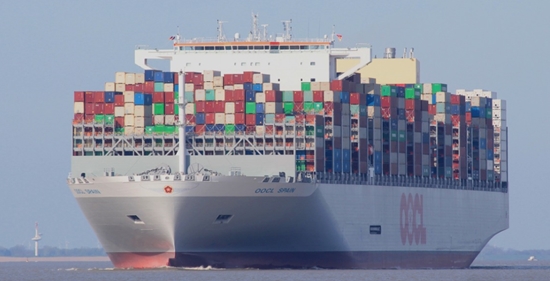
OOCL cargo ship
The determination of labor unions to squelch the competition may in this case be a good thing, since the ultimate target is the Chinese Communist Party and government.
The U.S. Trade Representative’s wants fleet operators to try to avoid using Chinese-made ships when bringing goods to U.S. ports (“Trump Administration Proposes Massive Port Fees on Chinese-Built Vessels,” gCaptain, February 24, 2025). The more extensive their use of such ships, the bigger the fees they’ll have to pay if the USTR’s proposals are enacted.
The proposed measures not only include a flat fee of $1,500,000 per port call of a Chinese-built vessel to a U.S. port, but also tiered fees per U.S. port call for operators with exposure to Chinese-built ships and newbuild orders at Chinese yards. For example, operators with fleets comprising more than 50% Chinese-built vessels could face fees up to $1 million per U.S. port call, while those with 25-50% Chinese-built vessels would pay up to $750,000 per call. Vessel operators with shipbuilding orders in China could also face fees up to $1 million per port call, based on orderbook composition.
The proposal would also mandate increasing percentages of U.S. exports to be carried on American-flag vessels. Starting at 1% of cargo immediately upon implementation, the requirements would rise to 15% within seven years, with specific allocations for U.S.-built vessels.
The action also targets China’s LOGINK logistics platform, citing concerns about sensitive data access. The proposal suggests potential restrictions or bans on LOGINK’s use in U.S. ports.
gCaptain lists the proposed fees, rollout schedules, and other details. The proposals come in response to China’s growing dominance of ship production worldwide, “from less than 5% in 1999 to over 50% in 2023.” China now also controls “95% of shipping container production” and owns about a fifth of the global commercial fleet.
The Office of the U.S. Trade Representative initiated its investigation in response to a petition submitted in March 2024 by five major U.S. labor unions. Interested parties can comment on the proposals at a March 25, 2025 public hearing or submit written comments by this date.
Also see:
gCaptain: “USTR Investigation Finds China’s Maritime Playbook ‘Unreasonable’ as U.S. Shipbuilding Hits Historic Low”
Office of the U.S. Trade Representative: “Report on China’s Targeting of the Maritime, Logistics, and Shipbuilding Sectors for Dominance”











